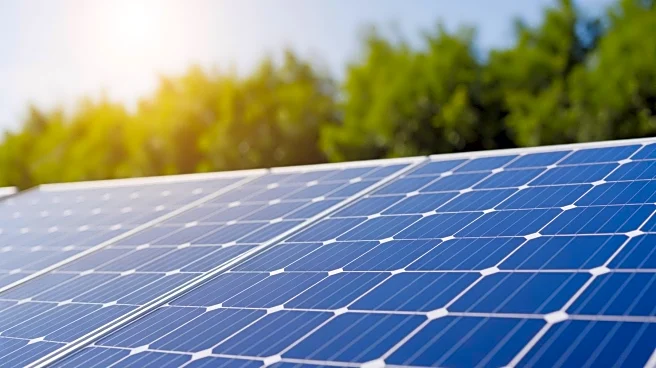What's Happening?
Qcells, a South Korean solar company and a unit of Hanwha Solutions, announced a temporary reduction in pay and working hours for approximately 1,000 of its 3,000 employees in Georgia. This decision comes
as U.S. Customs and Border Protection detains imported components needed for solar panel production, suspecting they may contain materials made with forced labor from China. Additionally, Qcells plans to lay off 300 workers from staffing agencies at its Dalton and Cartersville plants. Despite these challenges, Qcells maintains that its supply chain is free from forced labor and is sourced outside of China, with third-party audits and supplier guarantees supporting this claim. The company is working to normalize its supply chain operations and expects to resume full production soon.
Why It's Important?
The detainment of solar panel components by U.S. customs highlights the ongoing enforcement of the Uyghur Forced Labor Prevention Act, which restricts Chinese goods made with forced labor from entering the U.S. This situation underscores the complexities of global supply chains and the impact of geopolitical tensions on U.S. manufacturing. The temporary reduction in pay and hours, along with layoffs, affects the local workforce and raises concerns about operational efficiency and economic stability in the region. As Qcells continues to invest in its U.S. operations, including a $2.3 billion plant in Cartersville, the company remains committed to building a domestic solar supply chain, which could have long-term benefits for the U.S. renewable energy sector.
What's Next?
Qcells is cooperating with U.S. authorities to resolve the import detentions and expects to resume full production in the coming weeks. The company is completing a new plant in Cartersville to reduce reliance on imported solar modules, which could mitigate future supply chain disruptions. As the situation develops, stakeholders, including local employees, industry leaders, and policymakers, will be closely monitoring the impact on the U.S. solar industry and the broader implications for international trade relations.
Beyond the Headlines
The enforcement of the Uyghur Forced Labor Prevention Act reflects broader ethical and legal considerations in global trade, emphasizing the importance of supply chain transparency and human rights. This case may prompt other companies to reassess their supply chains and ensure compliance with international labor standards, potentially leading to shifts in sourcing strategies and increased scrutiny of global manufacturing practices.









